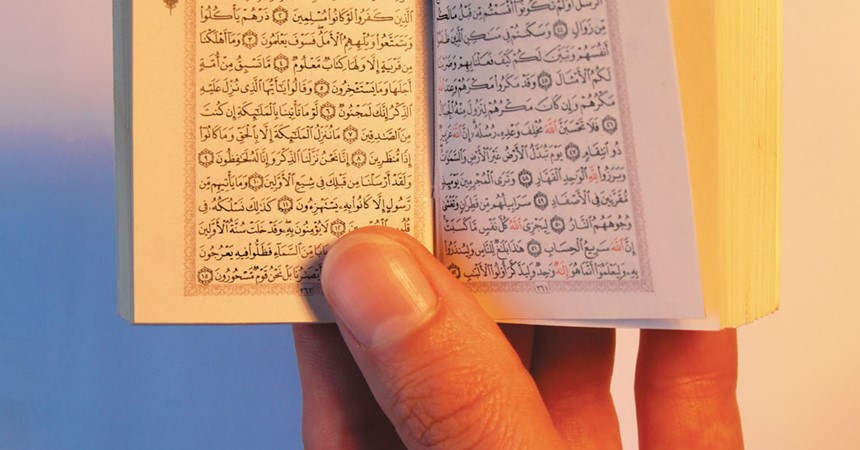“I bear witness that there is no god but God.”
“I bear witness that Muhammad is the prophet of God.”
Throughout the world, Muslims hear these two declarations echo through the call to prayer; they utter them in their five daily prayers and find them upon their lips throughout their lives. But to what is it that the two credal statements − the first pillar of Islam − call Muslims to witness?
“Say: ‘Truly, my prayer, and my acts of worship, my life and my death, are for Allah[i] [alone], the Sustainer of all the Worlds’.” (Quran 6:162)
The truths of the two creeds become apparent through the individual’s thoughts, speech and actions. Anything can potentially become the object of one's devotion. Thus, Muslims are called to negate, in their lives, everything other than God, after which only God remains. It is revelation that guides one to this, and it is to this that the second of the two creeds refers when affirming the prophethood of Muhammad[ii]. A Muslim is called to accept the prophetic claim of Muhammad as the one to whom the Quran was revealed and who, being the perfect embodiment of its message, himself becomes the source of guidance in the way he lived among the early Muslim community. Numerous companions of the Prophet imparted to later generations that guidance, which came to be encoded in the Hadith literature. Alongside the Quran, the Hadith forms the primary source of interpreting Islam. Understanding the life example of the Prophet − what he did, said and approved of − is integral to understanding the message of the Quran.
The first pillar of the Muslim is affirming with the tongue what is in the heart and the remaining four pillars show how that affirmation ought to be manifested in action. Five times a day, a Muslim prays to God, facing Mecca. Taking the time to pray throughout the day allows a Muslim to build and spiritually gauge his relationship with God. The prayers are a constant reminder, in a world of constant distractions, of what ought to ground us in our lives.
After prayers, the third pillar relates to the right of the needy. Muslims are required to purify their wealth yearly by distributing a part to those in need. Called Zakat, the Arabic word: “to purify” and “to grow” refers to two spiritual dimensions of this pillar. A Muslim purifies her wealth by making it a source of material benefit for others while allowing her soul to grow spiritually through detachment. The Zakat is the minimum Muslims give to the needy, but many events in life call for one’s generosity and the language of the Quran is morally edifying and encouraging:
“Establish regular Prayer and give regular Charity; and loan to Allah a Beautiful Loan. And whatever good you send forth for your souls you shall find it in Allah's Presence.” (Quran 73:20)
This “Beautiful Loan” is really an outcome of God’s generosity towards his creatures. Our generosity towards others is to be a reflection of God’s generosity towards us, for our relationship with God is intimately tied with our relationship with one another. It is to this that a prophetic tradition speaks in which God ascribes the abject needs of his servants to Himself, for which He rebukes “the son of Adam”[iii] for having neglected Him. Shocked, the son of Adam asks God how it is that He, “the Lord of the world”, can be in need? Had you fulfilled the needs of so and so, "you would have found Me with him” is the resounding reply.
The “Beautiful Loan” we metaphorically extend to God not only manifests itself through acts of charity but also through disciplining our souls by fasting (the fourth pillar). Every year for the month of Ramadan, Muslims fast from food, drink and sexual relations with their spouses between sunrise and sunset.
"O you who have attained to faith! Fasting is ordained for you as it was ordained for those before you, so that you might remain conscious of God.” (Quran 2:183)
But what is it to be conscious of God? It is recognising within ourselves the profound awareness of a personal God Whose living presence is brought into our lives through the obedience of his law. That obedience is the correct human response to the divine. Fasting cultivates consciousness of God in a number of ways. Through observing it, one finds that one has the ability to discipline the soul with others. Fasting provides a temporary state in which one can contemplate the plight of those for whom that state is permanent. It negates life’s pleasures temporarily to affirm their divine source, a reflection forming the basis for gratitude. One may add many other spiritual benefits, but what matters is that the command to fast issues from God, and love for God must be expressed through action.
Hajj, the last of the pillars, is one that many will recognise as the annual pilgrimage to Mecca. Once in their life, Muslims are commanded to do Hajj. Five times a day a Muslim faces the Kabba[iv] in prayer. The Kabba serves as a single direction for prayers and is what unifies all Muslims in their individual and communal prayers. There is not a moment in time, day or night, when someone is not in the state of prayer, facing the Kabba. Indeed, there is not a single moment in which the gates to the Kabba are shut; it remains a continuous witness to those in prayer and those proclaiming, in the Hajj, "Here I am Oh God, here I am [in your divine service].” The rites of the pilgrimage to Mecca are manifold and require the believer to be in an absolute state of physical and spiritual purity. The hardships that accompany the rites, which include circulating the Kabba seven times, are there as reminders that the path to God is to be taken with others.
O People! Behold, We have created you all out of a male and a female, and have made you into nations and tribes, so that you might come to know one another. Verily, the noblest of you in the sight of God is the one who is most deeply conscious of Him. Behold, God is all-knowing, all-aware. (Quran 49:14)
[i] Allah is the Arabic word for God as understood in traditional theism. Arabic-speaking Jews and Christians also use it.
[ii] It is part of Muslim piety to utter “peace and blessings of God be upon him” after the Prophet’s name and I exhort Muslim readers to do the same.
[iii] A phrase synonymous with humankind.
[iv] The cube-like structure in Mecca.























































































